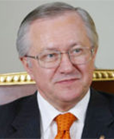Rome '08 Workshop
A Vision for Transatlantic Solidarity
Ambassador Borys Tarasyuk
Former Ukrainian Foreign Minister
TRANSATLANTIC UNITY AND SOLIDARITY
I would like to share with you my vision of transatlantic unity and solidarity as well as talk about Ukraine’s role in this process. Transatlantic unity and solidarity is an asset, which should not be neglected or even doubted due to the following essential reasons:
- The security and defence sector remains the least developed and consolidated element within all EU common policies.
- NATO as a mechanism of transatlantic unity and solidarity remains the most effective instrument to meet current challenges and guarantee security in Europe and the world.
- Today none of the international institutions is able to deal with instabilities and conflicts in the world. For example, given its recent decline in efficiency, the U.N. has sought to cooperate more often with NATO in conducting peacekeeping and peacemaking operations.
- In this regard, any transatlantic dispute that is motivated by a domestic political agenda not only undermines transatlantic unity and solidarity but affects the Alliance's ability to meet global challenges. As a result, a third party may win!
- The new initiative to establish an “all-European security system” is directed against transatlantic unity and solidarity and seeks to push the United States out of European affairs.
EU AND NATO ENLARGEMENT
Enlargement of the EU and NATO is another key issue exerting influence on global security. I am convinced that further enlargement will continue to strengthen security and stability. For example, the new members’ access to the European Union and North Atlantic Treaty Organization has enlarged the space of peace, stability and security in Europe.
Unfortunately, some internal problems and discussions within the EU and NATO as well as some external messages, threats and intimidation are preventing these organizations from implementing further enlargement policies. In the case of the EU, it was the referendum's failure in Ireland; in NATO’s case, it was the Bucharest Summit and the odd discussion over the name of the country.
DIRECT REPERCUSSIONS ON UKRAINE
Processes related to transatlantic unity and solidarity as well as to the enlargement of NATO and the EU all have direct repercussions on Ukraine. Today Ukraine is already a net contributor to peace and security in Europe and beyond.
- Ukraine is the only non-NATO country that participates in all NATO-led operations.
- Ukraine participates in all EU security-related operations. I believe that the European Union Border Assistance Mission (EUBAM) is a unique and successful operation which may serve as a pilot project for other regions.
Discussions prior to and during the Bucharest Summit over the Membership Action Plan (MAP) were rather dramatic. Some European countries stated that Ukraine was not ready to participate in the MAP. These statements appear quite strange to me because, as Ukraine's Foreign Minister at the time, I had an opportunity to participate in 2006 in the negotiations over the MAP. The main question then was not “if” but “when” Ukraine would receive the MAP—would it be during the Foreign Ministers meeting or during the NATO Summit in Riga?
Regarding the current situation and Ukraine’s chances to join the MAP in December or April, the unity and ability to resist external pressure is important. Certainly Ukraine still has to fulfill its commitments under the ATP-2008, which in fact overlaps with the requirements of the Membership Action Plan by 90%.
As to public opinion on the issue of NATO in Ukraine, I wonder if someone there was preoccupied with it in 2002 or 2003 when Ukraine passed the legislation that enshrined accession to the North Atlantic Treaty Organization as the ultimate goal of the Ukrainian foreign policy. Nobody was preoccupied with the public opinion in 2004 when the “Strategy of Economic and Social Development of Ukraine towards the European Integration for 2004 – 2015” was adopted under the full supervision of Prime Minister Victor Yanukovych. According to this strategy Ukraine had to approve the Membership Action Plan in 2004 and join NATO in 2008.
The situation with the poor public support of the strategic course towards the Euro-Atlantic integration is very similar to the situation previously observed in other Eastern European countries, which has proved that public opinion can be rapidly changed if the society gets access to the relevant information.
Membership in the North Atlantic Treaty Organization is an ultimate goal of the Ukrainian foreign policy because it means greater stability and security not only in Ukraine but also in entire Europe.

